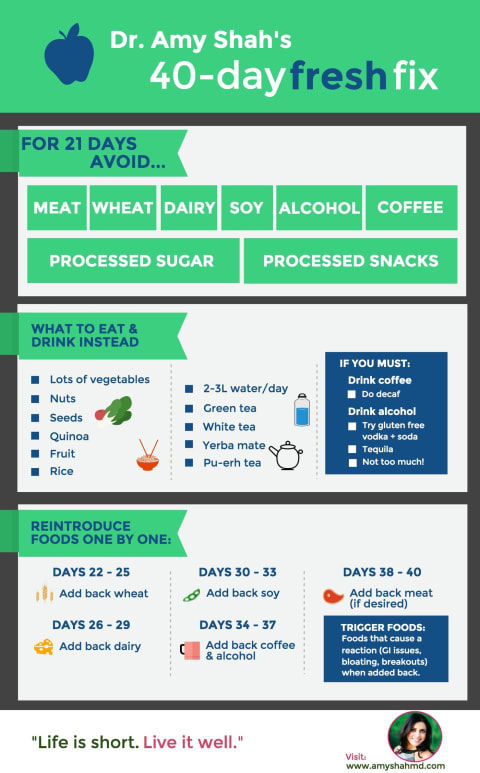Advertisement


Battling fatigue, bloating, constipation or unexplained weight gain? A food sensitivity might be to blame.
But do you need extensive testing done to pinpoint your specific sensitivities? No. These special blood labs tend to be very expensive (upward of $500, in my experience) and the results are controversial at best.
As a doctor who specializes in allergies and GI issues, I'd argue that a simple home test is better than any pricey lab. In fact, the gold standard of testing for allergies and sensitivities is a food challenge. Basically, this is an elimination diet, in which you remove certain foods and then gradually reintroduce them to see what might be triggering symptoms.
In the infographic below, I'm sharing a simple plan I've used with many of my patients, with great success:
First, you’ll avoid certain foods (the food groups that tend to most often cause a reaction) for 21 days. That's because you need a minimum of two to four weeks to see a change in your symptoms.
Then, you'll reintroduce each offending food one by one. By spacing out when you reintroduce them, you can see which might be causing symptoms. For example, if after adding back in wheat, you start to have bloating and fatigue, voilà! That's one of your food triggers. For optimal health, it might make sense to avoid wheat. This is not to say you can never have wheat — but this lets you know that you might want to avoid it for the most part.

Note: A food sensitivity is different from a food allergy, from which you can go into shock (anaphylaxis) even from tiny amounts of foods. If you have a true food allergy, you should not try this at home and should work with a board-certified allergist.

Dr. Amy Shah is a double board certified MD with training from Cornell, Columbia and Harvard Universities. She was named one of mindbodygreen's Top 100 Women In Wellness to Watch in 2015 and has been a guest on many national and local media shows. She helps busy people transform their health by reducing inflammation and eating more plants, utalizing the power of the microbiome to help digestion, natural hormone balance and food sensitivities. She is an expert on intermittent fasting for women and has a 2 week guided group program.
More from the author:
Functional Nutrition Training
Check out Functional Nutrition Coaching
A cutting-edge nutrition deep dive taught by 20+ top health & wellness experts
Learn moreMore from the author:
Functional Nutrition Training
Check out Functional Nutrition Coaching
A cutting-edge nutrition deep dive taught by 20+ top health & wellness experts
Learn more
Dr. Amy Shah is a double board certified MD with training from Cornell, Columbia and Harvard Universities. She was named one of mindbodygreen's Top 100 Women In Wellness to Watch in 2015 and has been a guest on many national and local media shows. She helps busy people transform their health by reducing inflammation and eating more plants, utalizing the power of the microbiome to help digestion, natural hormone balance and food sensitivities. She is an expert on intermittent fasting for women and has a 2 week guided group program.